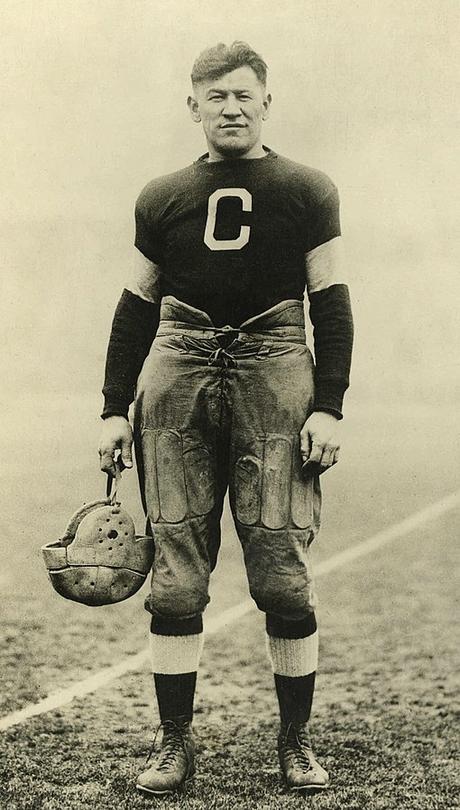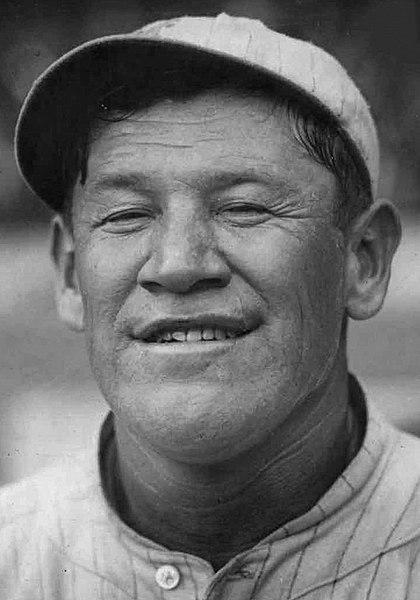Jim Thorpe is considered by many to be the greatest athlete of the early twentieth century. He was a multi-sport athlete who particularly shined in track and field, though he also had professional careers in both baseball and football.
The details surrounding the birth of Jim Thorpe aren’t entirely clear. It is generally accepted that James Francis Thorpe was born May 22 or 28, 1887, with no birth certificate found to confirm an exact date. He was born in Indian Territory near present-day Prague, Oklahoma to Hiram Thorpe, who was of Sac and Fox descent, and Charlotte Vieux, who was of Potawatomi descent. Jim Thorpe had a twin brother, Charlie, who died of pneumonia when the pair was nine years old.
Both of Thorpe’s parents were Roman Catholic, and in the Catholic Church, he was baptized Jacobus Franciscus Thorpe. Growing up, Thorpe was raised as a Sac and Fox, and his native name, Wa-Tho-Huk, translates as “Bright Path.” Six year after his brother Charlie’s death, Thorpe’s mother also passed away, and his father would follow when Jim was just sixteen years old.
Thorpe was sent to many boarding schools and academies throughout his youth, including Sac and Fox Indian Agency School near Tecumseh, Oklahoma, Haskell Institute in Lawrence, Kansas, and Carlisle Indian Industrial School in Carlisle, Pennsylvania. Jim Thorpe hated his experiences in these institutions, which were set up to teach racial integration, banning students from speaking their native languages and imposing the dress of the average white American. Thorpe’s academic performance was less than stellar, but he showed tremendous promise as an athlete.

Jim Thorpe with the Canton Bulldogs, c. 1915-1920 (Wikipedia)
While attending Carlisle, Thorpe competed not only in track and field, but also in football, baseball, lacrosse, and even ballroom dancing. It was here that Thorpe’s athletic abilities started to garner nationwide attention, especially on the football field, where he earned All-American honors in both 1911 and 1912. However, it was in track and field that Thorpe would really leave his mark.
In 1912, Thorpe represented the United States in the Summer Olympics held in Stockholm, Sweden. He dominated in both the pentathlon and the decathlon, winning gold medals in both events. He remains the only athlete in history to accomplish this feat. What makes this accomplishment even more incredible is that Thorpe competed wearing mismatched shoes. Ahead of competition, Thorpe’s own shoes were stolen. The culprit behind the theft was never identified, but it goes to show how rampantly racism continued to persist against indigenous peoples. With no other options, Thorpe found two old, different shoes in a dumpster, one of which was larger than the other. He wore an extra sock on one foot to help the larger shoe fit better.
Jim Thorpe at the 1912 Summer Olympics (Wikipedia)
Unfortunately for Jim Thorpe, in 1912, strict rules regarding amateurism were in effect for athletes participating in the Olympics. Thorpe had played professional baseball in the Eastern Carolina League for Rocky Mount, North Carolina in 1909 and 1910, receiving meager pay. College players, in fact, regularly spent summers playing professionally in order to earn some money, but most used aliases, which Thorpe, unfortunately, did not do. When reports of Thorpe’s past activities were leaked by the press in early 1913, the Amateur Athletic Union decided to withdraw Thorpe’s amateur status retroactively. Later that year, the International Olympic Committee (IOC) unanimously decided to strip Thorpe of his Olympic titles, medals, and awards, and declare him a professional.
In 1913, Thorpe signed to play professional baseball with the New York Giants. Thorpe played sporadically with the team for three seasons as an outfielder. After playing in the minor leagues with the Milwaukee Brewers in 1916, he returned to the Giants in 1917 and was sold to the Cincinnati Reds early in the season. Late in that same season, he was sold back to the Giants. Once again, Thorpe played sporadically for the Giants in 1918 before being traded to the Boston Braves in May 1919.
In his major league career, Thorpe amassed 91 runs scored and 82 RBIs. Thorpe struggled against the curveball, however, and batted just .252 over his six-year big league career. In his final season, however, Thorpe did manage to attain an impressive .327 average for the season. He would continue to play minor league baseball until 1922.

Thorpe as a member of the New York Giants (The Sporting News)
In 1915, Jim Thorpe signed a deal to play football with the Canton Bulldogs for $250 per game under general manager Jack Cusack. Thorpe would play and coach the Canton Bulldogs during his time with the team and was considered one of the best players in the sport at the time. The Bulldogs would claim an unofficial three world championships in 1916, 1917, and 1919. When the National Football League (NFL) was officially formed in 1920, Thorpe was selected to be the league’s first president. Thorpe retired from professional football at age 41, having played 52 NFL games for six teams from 1920 to 1928.
Thorpe married three times throughout his life and had a total of eight children. After his athletic career came to an end, Thorpe struggled to provide for his family. He found it difficult to work a non-sports-related job and never held a job for an extended period of time. On March 28, 1953, Jim Thorpe died of heart failure.
Over the years, supporters of Thorpe attempted to have his Olympic titles reinstated. On January 18, 1983, almost 30 years after his death, the International Olympic Committee officially reinstated Thorpe’s medals from the 1912 Games at a ceremony attended by two of his children.
In addition, Jim Thorpe was inducted into the College Football Hall of Fame in 1951. He was a Charter Enshrinee in the Pro Football Hall of Fame in 1963. In 1950, he was named AP’s Most Outstanding Athlete of the First Half of the 20th Century, America’s Greatest Football Player of the half-century, and the national press selected him the most outstanding athlete of the first half of the 20th Century. Thorpe was inducted into the National Track and Field Hall of Fame in 1975, and from 1996-2001, he was continuously awarded ABC’s Wide World of Sports Athlete of the Century award.

